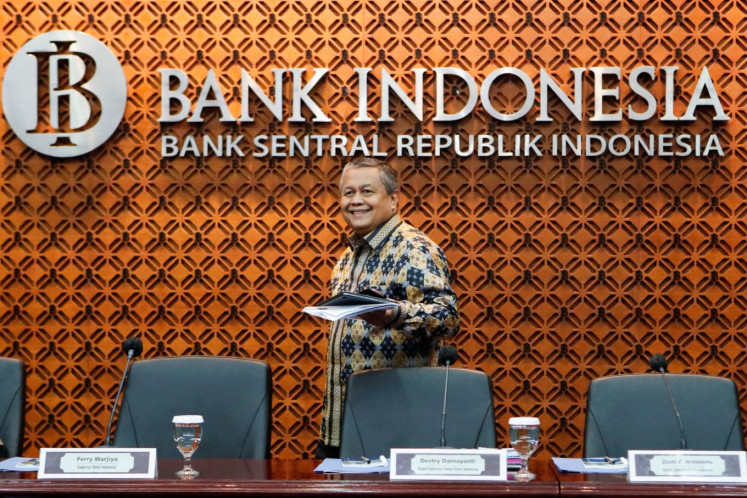Popular Reads
Top Results
Can't find what you're looking for?
View all search resultsPopular Reads
Top Results
Can't find what you're looking for?
View all search resultsManagement accounting: Transforming the finance function
A year on from the collapse of Lehman Brothers and the violent financial storm that ensued, we appear to be in calmer waters
Change text size
Gift Premium Articles
to Anyone
A
year on from the collapse of Lehman Brothers and the violent financial storm that ensued, we appear to be in calmer waters. Some people are even daring to mention the green shoots of recovery.
These might turn out to be fragile and it would be dangerous to assume that there are no further crises to come. But we do have a valuable breathing space in which to review the story so far.
It’s no surprise that the policy debate is moving into full swing and various new ideas are being suggested, for example, introducing separate risk committees for banking institutions.
In one sense, we have returned to a situation like the one we found ourselves in after the collapses of Enron and WorldCom, which saw the introduction of the Sarbanes-Oxley Act 2002 (Sox) in the US and a host of new corporate governance codes around the globe.
Although there is evidence to show that many organizations have found Sox useful, and that the adoption of best-practice governance frameworks has helped non-financial companies to weather the storm, we should be mindful that codes and legislation will get us only so far.
What really matters is getting behind the codes of corporate governance to ensure that the right behavior and processes are truly ingrained in the organizational DNA – remember that even Enron ticked all the right boxes as far as governance was concerned.
During a recent breakfast seminar organized by CIMA and attended by senior management accountants to discuss board effectiveness there was no doubt about this requirement.
All of the participants were executive or non-executive directors in the FTSE 350 and all of them recognized the importance of embedding the right culture throughout their companies.
As you might expect from a group of financial managers, they took a highly practical approach when it came to questions such as: How do you resolve the information gap between non-executives and executives?
What underpins this is the power of management accounting to provide the information that continually drives the business. Financial accounting certainly has its place and a company’s financial results mirror how its performance has been managed. But, although stakeholders want to know what has happened, they also need an idea of what the future holds.
Rather than just studying how an organization has performed in the past, chartered management accountants are geared towards analyzing performance, assessing business possibilities, grasping opportunities and shaping the future. Management accounting, with its predictive potential, has much to offer here.
Enlightened companies are already well on the way to transforming their finance functions to be more efficient and to better support decision-making.
This has included developing finance professionals and deploying them as finance business partners across the business.
This gives organizations a competitive advantage. Any organization not taking the opportunity to transform its finance function in this way could be putting its competitive position at risk.
There is already evidence of a correlation between companies where finance functions have been transformed to improve the focus on performance management and superior returns for shareholders.
This is achieved though improved performance and more reliable forecasting giving investors greater confidence.
Management accountants are not limited to the finance function and are best placed to work in such value-adding roles while still retaining their traditional skill-set of processing transactions, producing accounts and preparing management information.
There is an exciting opportunity for management accountants to reinvent themselves as a new form of finance business partner, particularly in the Middle East. The region’s relative resilience to the overall effect of the global economic downturn puts it in an advantageous position to transform the finance function.
The nature of Middle Eastern markets as a global hub for multinational companies provides the flexibility and expertise to facilitate such a transformation. They can improve decision-making by providing better information and helping to manage performance and risk so that
financial targets and strategic objectives are achieved.
Companies need to determine what role they want finance to play and a finance strategy to ensure that they are developing the finance capabilities necessary to deliver the service that is required. In particular, clarity is required about the role of finance business partners in the business. Only then can the skill sets required be defined and training programs developed.
The need for “finance transformation” has been recognized for over a decade. This is a journey toward a situation where the efficiency of finance operations has been maximized, management information is insightful and actionable and finance is seen less as a necessary overhead and more as an important management discipline that enables value creation.
This destination may always be hazy and beyond the horizon, but the direction seems clear and some organizations have taken an early lead.
Yet, many organizations’ accounting and finance functions still see this as a distant future. They will have reduced their costs. They may even have people termed “business partners” or “finance managers”.
But if the emphasis is still on accounting processes and financial reporting, these finance functions have not been transformed.
They may have become more efficient but can still be seen by some as more of an overhead than an enabler.
But, although stakeholders want to know what has happened, they also need an idea of what the future holds.
The writer is CIMA President. For more information, please visit www.cimaglobal.com.










